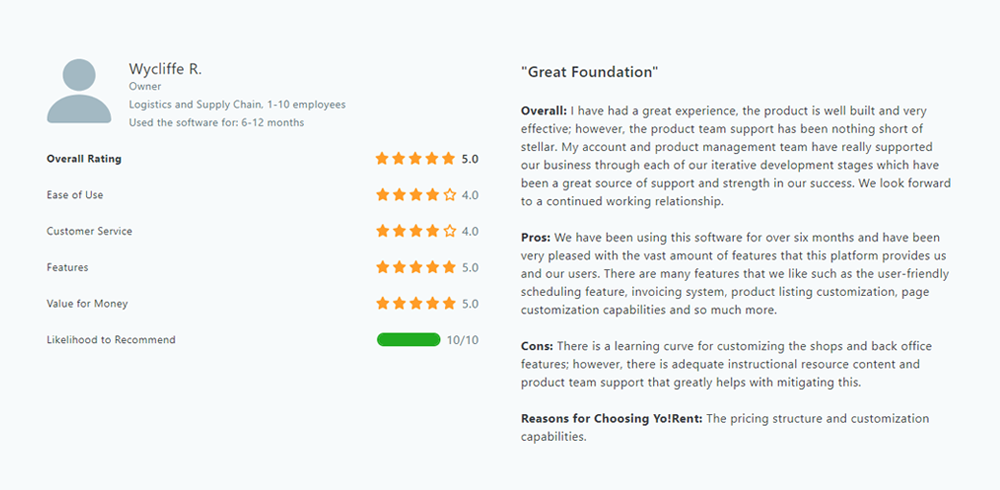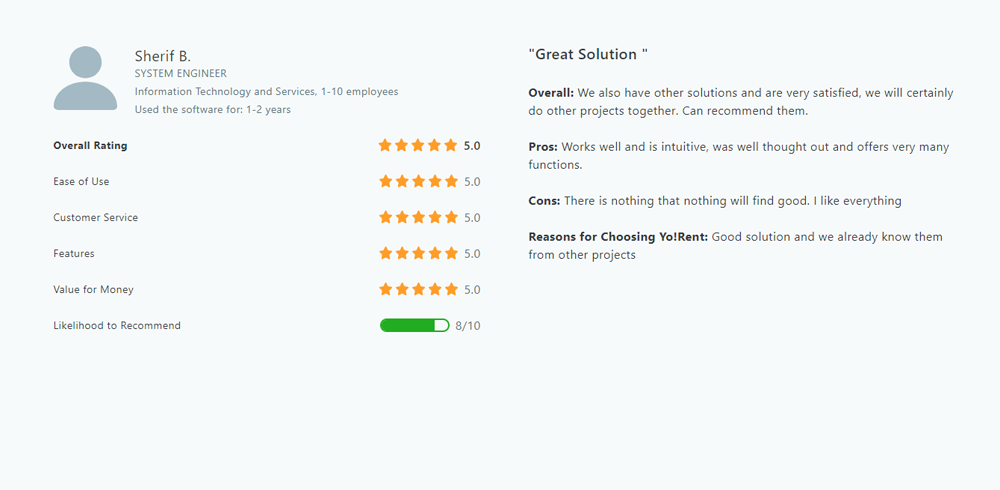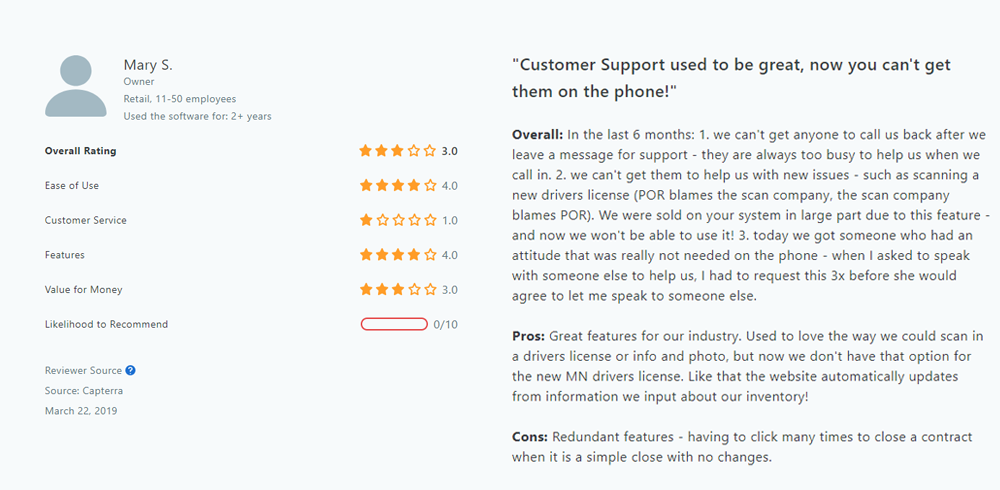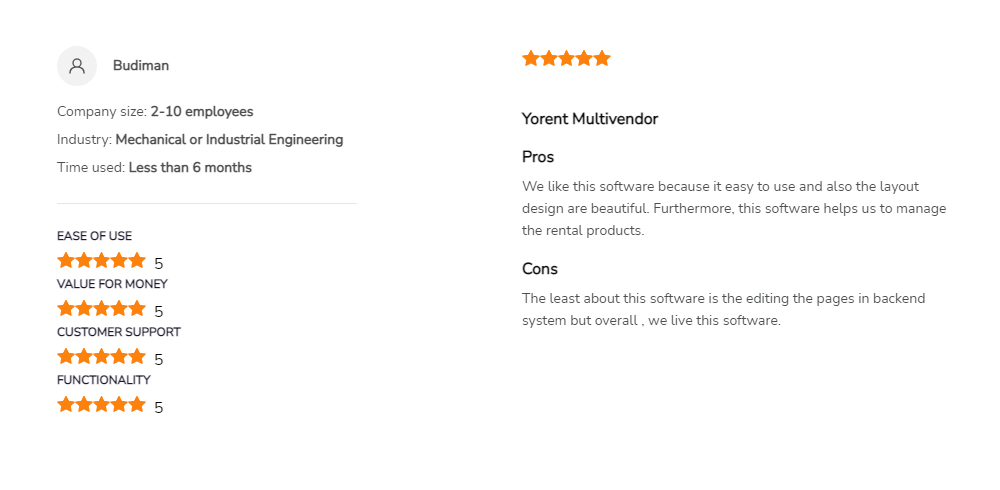Overview
A quick look at the key highlights of the two software. We can see that while serving the same purpose, i.e digitizing rental operations, both software are based on different licensing models. Without getting into which model is better, our comparison will focus on the delivered value, different use cases, versatility, reliability and support and pricing of the two software.
- Rental Software With The Option To Enable Selling Functionality
- Supports Both Single Vendor(Online rental storefront) and Multi vendor marketplace operations
- Self-Hosted
- Caters SMBs + Enterprise Needs
- On Premise License
- Exclusively Rental Software
- Only supports Single Vendor(online rental storefront) operations
- Cloud Hosted
- Caters SMBs & Large Businesses
- SaaS Model
Feature By Feature Comparison - Yo!Rent vs Point of Rental
Moving on to the key capabilities, following is a decent thumbnail sketch of how the two software stack up against each other. This comparison pits Yo!Rent and Point of Rental head to head along some key facets viz. design, functionality, technology framework, and support. While the two software are quite evenly matched, Yo!Rent seems to take a slender lead in terms of the extensive features and use-cases it caters.
| Admin Features |
|
 |
|---|---|---|
| RFQ (Request for Quotation) Module | ||
| Price Surge Module | ||
| Late Return Module | ||
| Add-on Services Module | ||
| Cancellation Module | ||
| Import/Export Module | (Only Manual Import Available) | |
| Blog & Social Media Integration | ||
| PPC Ads | ||
| FAQ Module | ||
| Personalized Homepage | ||
| Reporting & Analytics | ||
| Top Rented Products Report | ||
| Top Searched Products Report | ||
| Buyer/Seller Sign-ups Report | ||
| Advertisers Report |
| Vendor Features |
|
 |
|---|---|---|
| Selling Functionalities | ||
| Agreement Management & eSign | ||
| Product Inspection | ||
| Tiered Pricing | ||
| Product Catalog Management | ||
| Inventory Management | ||
| Product Reviews Management | ||
| Shipping & Delivery Module | ||
| Abandoned Cart Management | ||
| Invoicing Module | ||
| Individual Vendor Storefronts | ||
| Latest Orders Report | ||
| Products Inventory Report | ||
| Rental Security Management |
| Buyer Features |
|
 |
|---|---|---|
| Map View For Shops | ||
| Advanced Search Functionality | ||
| Custom Filters | ||
| Product Comparison | ||
| Multicart Checkout | ||
| Location Based Product Sorting | ||
| Featured Products Section | ||
| Map View |
| Add-ons |
|
 |
|---|---|---|
| Discount Coupons | ||
| eWallet Management | ||
| Tax Management | ||
| Currency Converter |
| Security Features |
|
 |
|---|---|---|
| Document Verification | ||
| GDPR Compliant | ||
| Multi Layered Security |
User-Experience - From Design, Process-flows to Operability
When analyzing the user experience of the two software, we’re chiefly concerned with the ease of use, self-intuitiveness, and some key design and visual elements. In Point of Rental, the outdatedness of the architecture is clearly evident from the get-go. Estimating processes are awfully slow and order details need to be completed across a series of tabs, as opposed to a single screen in most modern software. Also, some users have reported issues with User IDs, passwords, and printing features. All in all, it’s a software that fails to address the basic needs of a rental business.
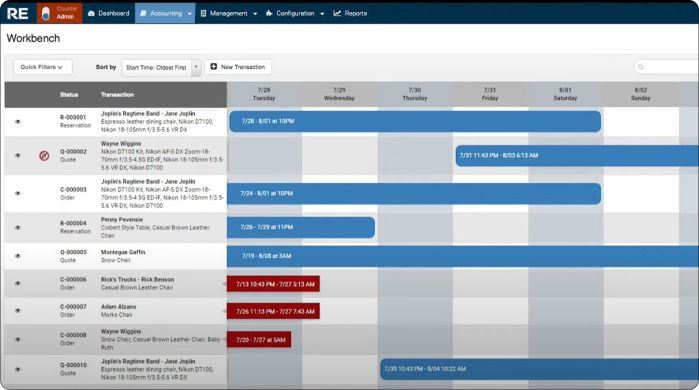
Compare that with Yo!Rent, where the design layout is beautiful and inviting; as an admin/operator, you’re drawn to explore and check out the system in its entirety. Talking of exploring, the interface is quite intuitive and offers absolute ease of use. The order management functionality, unlike in Point of Rental, displays all the order details, shipping and payment status, delivery address and invoice numbers. Moreover, Yo!Rent can be easily customized to support multiple revenue streams.
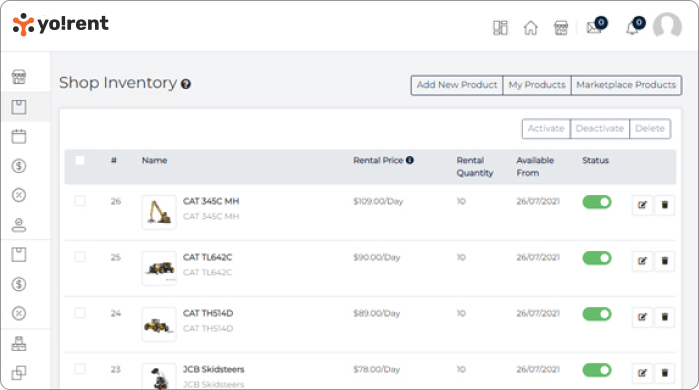
Niches & Market Segments Catered
The number of niches a rental software can cater is a decent indicator of its adaptiveness and customizability. We feel the scores are even in this segment. Both Yo!Rent and Point of Rental cater a wide range of niches across the rental industry, with most notable ones being Heavy Equipment Rental in the B2B domain and Car Rental, Dress Rental, Events Rental, Sports Rental and Furniture Rental among many others in the expansive B2C domain


Customizability To Meet Diverse Requirements
Customizability has become the gold standard in today’s software industry as almost all businesses have some unique expectations/requirements about how different processes should flow. Both Yo!Rent and Point of Rental claim customizability as their key offering. So who has the upper hand here?
We found that while Point of Rental offers some customizable options, particularly in the contracts module, it’s only Yo!Rent that does justice to its claims of true customizability. 4 fully-fledged, niche-oriented variants, with their most relevant features, user-journeys, and design cues make it a software of the highest order.
Documentation & User-Guides
In most countries, you can’t sell software without proper documentation and user guides. That’s why a comparison on this point is certainly necessary. In Yo!Rent, the platform owner gets access to a comprehensive knowledge base that comprises user manuals, set-up guides to activate 3rd party APIs, feature lists, and video tutorials. In Point of Rental, most of the help guides are in the video format but nothing in the way of documentation, which showcases the entire functionality of a platform. That is certainly a concern as failure to find timely assistance/direction in certain use-cases, not covered in video-guides, can lead to a disappointing user experience.
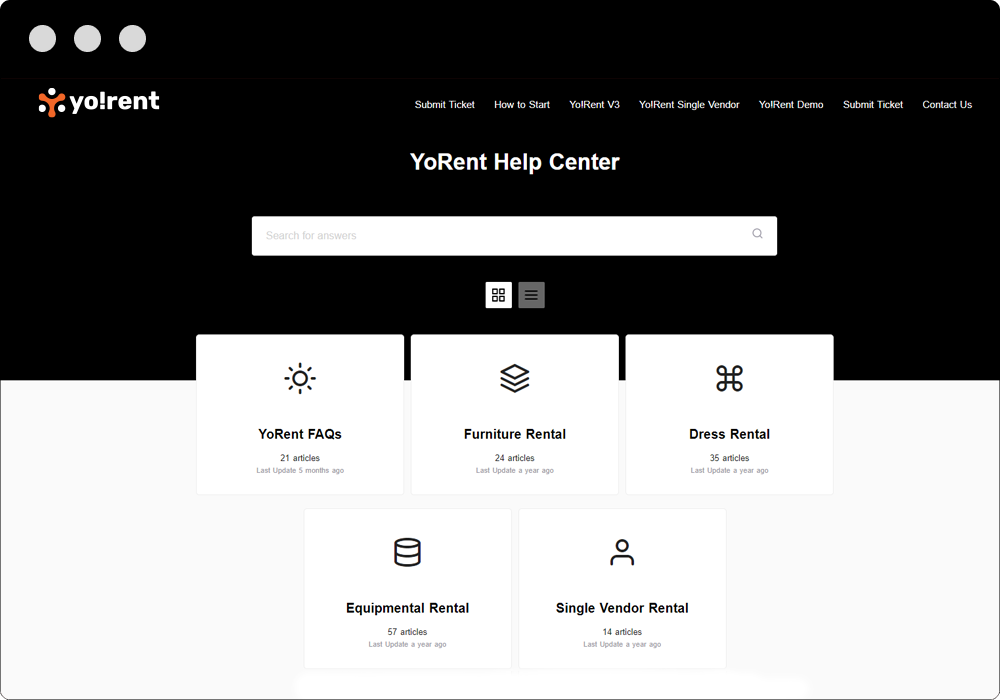
Key Quantifiables - APIs, Payment Gateways & Additional Support
Moving on to the auxiliary components of the software, we’ll consider the integrated APIs, payment gateways and customer support in the two software. Point of Rental seems to keep things very closed in terms of its offerings and as a result complaints for a lack of 3rd party and custom API support are rife. As for a handful of APIs, chiefly QuickBooks and iFrame, that are supported, concerns with their incompatibility, crash instances, and other issues are not uncommon. To make matters worse, customers not in the Expert or Elite category, find it very difficult to get across to the support representatives.
On the contrary, Yo!Rent offers 23+ payment gateways plus MailChimp, Google Maps and Google Analytics out of the box. And thankfully, all Yo!Rent licenses are sold with 1 year free technical support and expert digital marketing services.

Recurring Subscription Cost Vs One Time On-Premise License Cost
Let’s take a look at the cost of ownership in the two software. As we noted earlier in the comparison, Point of Rental is a SAAS solution and charges a monthly subscription fee while Yo!Rent is an On-Premise-License based solution that can be availed at a one-time cost for perpetual ownership. Presumably, the upfront cost of ownership is higher in Yo!Rent compared to Point of Rental($175/month). But that higher upfront cost evens out in the long run(possibly as few as 6 months).
For an entrepreneur with a sound business plan and decent technology know-how, Yo!Rent can be the perfect solution given its expansive feature coverage, pre-integrate APIs and highly scalable architecture.
Our Verdict
While Point of Rental has its merits and certainly remains a key player in the online rental software market, we strongly believe that it’s quite overpriced for most businesses in the startup category. It includes so many redundant features that no doubt add to the final cost, and there’s no easy way to opt out of them in the subscription plan.
In stark contrast, Yo!Rent with its reasonably priced on-premise licensing, highly scalable architecture, and tailored niche-specific variants is ideal for the most rental businesses in the SMB category and beyond that.

